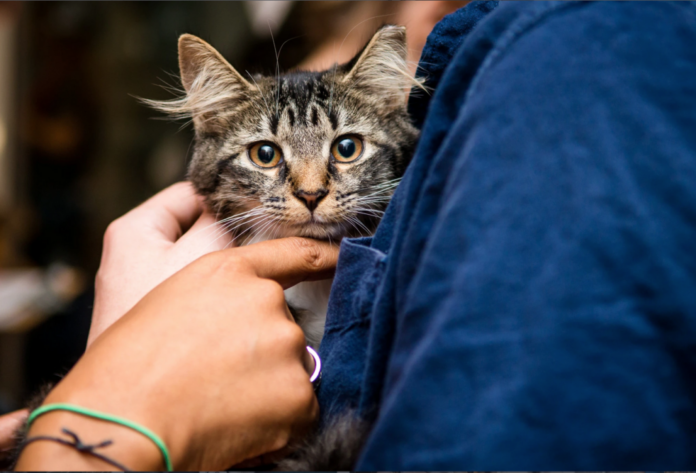By Darla Shelden, City Sentinel Reporter —
OKLAHOMA CITY– Oklahoma saw a significant decrease in the number of shelter animals euthanized in 2023. According to Best Friends Animal Society, a leading animal welfare organization, Oklahoma came in eighth in Best Friends’ latest state-by-state ranking unnecessary pet shelter deaths, remaining unchanged from last year.
The Best Friends’ pet lifesaving dataset gives a national overview of the number of dogs and cats entering and exiting U.S. shelters each year.
This data showed that Oklahoma shelters took in 89,353 dogs and cats in 2023. Of those, 69,545 found positive outcomes, while 11,560 were killed. This equals a save rate of 77.8 percent for Oklahoma, up from 73.1 percent in 2019.
Currently, 38.7 percent of the 119 Oklahoma shelters are ‘no-kill.’
“While the latest numbers are definitely encouraging, Oklahoma’s shelter animal euthanasia rate is still needlessly high and our goal is to stem the tide,” said Kelly Burley, Common Bonds Director. “We are committed to improving connections between shelters, their municipalities, and their communities to lower shelter animal intake and increase live outcomes.”
Located in Oklahoma City, Common Bonds, a network of local, state, and national animal welfare organizations, united with Best Friends Animal Society in 2019 to help Oklahoma achieve no kill by 2025. The collaboration encourages communities to commit to the 90 percent save rate and shelter data reporting in the Shelter Animals Count national database. More information is available here.
For the past six years, Best Friends has led a first of its kind extensive data collection process that involved coordinated outreach to every shelter in America followed by additional research, data analysis, and technology development.
The dataset is the most comprehensive on sheltered animals, based off data directly from shelters, state and local coalitions, government websites, and even Freedom of Information Act (FOIA) requests.
In April of 2023, Best Friends began a partnership with Tulsa Animal Welfare, including embedding full-time staff dedicated to implementing best operating policies and practices.
Tulsa Animal Welfare has one of the largest lifesaving gaps in the state and is committed to improving upon that number through the embed partnership, as well as sustaining the improvements once the partnership ends.
The COVID-19 pandemic impacted this year’s data, as many shelters or services had to partially close or reduce services. Communities and individuals filled that gap through volunteering, fostering, and adopting.
As a result of Covid, fewer pets entered shelters and more lives were saved, said Julie Castle, CEO of Best Friends Animal Society.
“This was a monumental year for cats and dogs in America’s shelters,” said Castle. “We saw communities, shelters, and individuals step up for animals in ways we couldn’t have imagined, and now we are closer than ever before to achieving our goal of no-kill by 2025.”
According to the press release, nationally, about 347,000 cats and dogs were killed in America’s shelters in 2023, down from 625,000 in 2019. This is the largest yearly reduction in dogs and cats killed in the nation’s shelters (44.5 percent) to date, putting the nation at an 83 percent save rate.
Best Friends has the most comprehensive national data on sheltered animals, representing an estimated 93 percent of all sheltered dogs and cats in the country.
“Since we announced our no-kill goal the number of cats and dogs killed in shelters has decreased by 76 percent, down from about 1.5 million in 2016, Castle said. “This is incredible progress, but we must never lose sight that there are still over 950 cats and dogs killed every day just because they do not have a safe place to call home.”
The data also shows that cats continue to be killed at a rate of more than two cats to one dog, even though intake of dogs is roughly five percent higher. Outdoor community cats make up the majority of cats killed in shelters. Community cat programs have created a notable reduction in the number of cats entering shelters and significant improvements in save rates.
A 90 percent save rate is the nationally recognized benchmark to be considered “no-kill,” factoring that approximately 10 percent of pets who enter shelters have medical or behavioral circumstances that warrant humane euthanasia rather than killing for lack of space.
In a recent survey commissioned by Best Friends, 59 percent of general public respondents considering adopting are delaying the process because of returning to the office, taking vacations, starting a new job, and other reasons. In addition, more than half of respondents shared that adoption is the preferred method for acquiring a pet, rather than purchasing from a breeder or pet store.
“I’ve said it many times before, but now more than ever, we need the public to adopt or foster,” said Best Friends CEO Julie Castle. “If you have been considering getting a new pet, now is the time. The public stepped up during the pandemic, and we need to do it again because countless animals’ lives are at stake if this progress backslides.”
Best Friends conducted a survey of more than 150 shelters and animal organizations, of which 88 percent noted that they were short on staffing. More than half (57percent) have cut hours or programs due to short staffing. 41 percent are operating down more than 25 percent of normal staffing, and 62 percent are operating more than 10 percent below normal staffing levels. Government shelters and private shelters with government contracts are more impacted than other shelter types.
Due to understaffing, many organizations are unable to carry out regular operations such a hosting adoption events, supplying enough veterinary support, maintaining regular hours with public access, and/or providing sufficient adoption/foster support and animal care as they would like.
To encourage people to adopt, Best Friends has launched a nationwide campaign. The primary target will be the states most in need, including California, Texas, Florida, Louisiana, North Carolina, Georgia, Alabama (which combined make up 50 percent of the dogs and cats still being killed in the nation), Illinois, and Oklahoma.
“Shelters, and the animals in them need our help in a big way,” Castle continued. “Pets have been a part of our lives long before the pandemic, and we want to work with families to help them find their best friend while also saving a life.”
Working collaboratively with a network of more than 3,300 animal welfare and shelter partners, and community members nationwide, Best Friends is working to Save Them All®.
For more information, visit bestfriends.org.






















